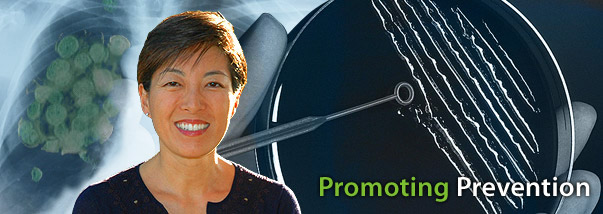Sora Park Tanjasiri, Director of New CSUF Center for Cancer Disparities Research, Raises Awareness
January 17 , 2007
By Mimi Ko Cruz
Commonly seen as a private disease, cancer is something many Pacific Islanders
tend to hide from their relatives, keeping it a secret until they die.“It’s a very personal disease in the Samoan and other Pacific Island cultures. Part of the stigma is that if you have cancer, you did something wrong in your life to deserve it,” said Sora Park Tanjasiri, associate professor of health science and director of Cal State Fullerton’s new Center for Cancer Disparities Research.
Tanjasiri is working to reverse those beliefs through research that has prompted cancer awareness and prevention education in Pacific Islander communities throughout the nation. Since she arrived on campus in 2003, Tanjasiri has garnered more than $3 million in grants for these efforts.
At present, her activities are supported by a $496,552 grant from the National Cancer Institute, part of the National Institutes of Health, for WINCART — Weaving an Islander Network for Cancer Awareness, Research and Training. The project brings together Pacific Islander community organizations with the goal of “decreasing cancer disparities among native Hawaiians, Chamorros, Tongans, Samoans and the Marshallese,” Tanjasiri said. Her scientific advisers include researchers from UC Irvine, UCLA, USC and UC Riverside.
This is the second year of a five-year, $2.6-million project. Last year, Tanjasiri focused on launching Pacific Island community education campaigns and providing training for researchers. This year, she is developing grant proposals — four are currently under review — for data analysis on mortality rates among Pacific Islanders, studying their obesity and nutrition needs and planning intervention campaigns.
According to U.S. Census data, about 100,000 Pacific Islanders reside in Southern California. Because it is suspected that Pacific Islanders have the highest cancer mortality rate among Asians in America, Tanjasiri believes it is critical to try to increase survival rates.
Cancer has surpassed heart disease as the leading cause of death in the United States, according to the Journal of the National Cancer Institute. That makes any effort to prevent cancer urgent, Tanjasiri said.
“What we know is that Pacific Islanders have high rates of behaviors that put them at risk for cancer,” she said. “The number of smokers is high. Their nutrition is high in Western fatty foods, not traditional rice, grains and fish; they have low levels of physical activity; women are not getting mammograms or pap smears, and men are not getting prostate exams; education levels are low, and many aren’t English proficient.”
It is imperative, she said, to figure out ways to reach and educate the Pacific Islander community about cancer prevention behaviors, such as getting regular physical exams, eating healthy foods and exercising.
“In general, our focus is on cancers that are preventable,” she added. “We’re researching to uncover the risk factors and the reasons why Pacific Islanders, for the most part, don’t practice preventive behaviors.”
One factor may be because Pacific Islanders prefer to see doctors of their own ethnic backgrounds, but such doctors are few. “There is only one Samoan doctor in all of Southern California — in Carson,” Tanjasiri said.
Another barrier might be language and overcoming cultural beliefs that could be detrimental.
Because Pacific Islanders are “underserved and their social support needs are unmet,” Tanjasiri said, “we want to reach them and change their cancer-risk behaviors.”
In that vein, she is working with community organizations to design social support programs.
“Our community is small so we have pretty much been left out of research projects. But, through Sora’s work and the WINCART project, we are learning so much about the needs of Pacific Islanders and how to conduct culturally tailored outreach and education and promote early cancer detection and annual screenings,” said Lola Sablan-Santos, executive director of Guam Communications Network, a nonprofit multiservice Chamorro community agency based in Long Beach.
Among Tanjasiri’s research projects is a pilot program assessing the needs of Samoan breast cancer survivors. Funded by a $47,062 University of California Regents grant, the project aims to ultimately increase support services through a partnership with the Samoan National Nurses Association.
The UC Regents also awarded $150,860 to Tanjasiri to study the environmental influences of tobacco use in Asian American and Pacific Islander communities. That research, which began in 2004, involved a survey of tobacco advertisements in four different communities. High school students conducted the surveys and found that in densely populated areas, such as Long Beach, kids were exposed to more tobacco ads where they live and go to school. As a result, the city of Long Beach passed a law limiting such advertising, Tanjasiri said. The hope is to have other cities follow suit, she added.
Tanjasiri’s other research projects include promoting access to health services for Southeast Asian and Pacific Islander women, producing a video encouraging cancer screenings in Thai women, and raising cancer awareness in Korean and Chinese communities in Orange County.
Born in London, Tanjasiri has a master of public health and doctorate from UCLA.
| Media Contacts: | Sora Park Tanjasiri, Health Science, 657-278-4592, stanjasiri@fullerton.edu Mimi Ko Cruz, Public Affairs, 657-278-7586 or mkocruz@fullerton.edu |


 Produced by the Office of Public Affairs at California State University, Fullerton.
Produced by the Office of Public Affairs at California State University, Fullerton.